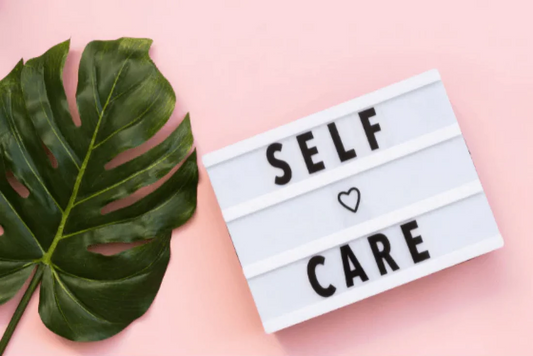More often than not, we're our own toughest critics. But introducing some mindful self-compassion into our lives can be a transformative practice, leading to greater emotional resilience.
Mindful self-compassion teaches us to be kind to ourselves, particularly in moments of difficulty or failure, allowing us to recognize our intrinsic humanity and fallibility. It's about giving ourselves the same kindness we'd offer to a good friend.
"The one thing you want to do is to love, and that love should begin with you. Once you love you, you love the whole world." -Dr. Sebi
This introduction to mindful self-compassion will explore seven practical ways to integrate this nurturing attitude into the fabric of your daily life, helping you to meet life's challenges with a gentler, more understanding heart.
What Is Mindful Self-Compassion?
Mindful self-compassion merges the principles of mindfulness—moment-by-moment awareness—with self-compassion, emphasizing kindness toward oneself.
Developed by researchers Kristin Neff, PhD, and Christopher Germer, PhD, founders of the Center for Mindful Self-Compassion, this approach teaches us to respond to our difficulties and failures with the same warmth and understanding we'd offer a friend, rather than with criticism or judgment.
What Are the Three Pillars of Mindful Self-Compassion?
Defined by Neff, mindful self-compassion involves three pillars:
- Self-kindness vs. self-judgment
- Common humanity vs. isolation
- Mindfulness vs. over-identification
By treating ourselves with kindness and recognizing our experiences as part of the broader human experience, we can transform our relationship with ourselves.
How Hemp Helps With Mindful Self-Compassion
Hemps interaction with the body's endocannabinoid system — which plays a key role in regulating mood and stress responses — can help you be less reactive to negative emotions and approach personal challenges with kindness and understanding.
Moreover, the calming effects of Hemp can help you focus and stay present, per a January 2021 study in Frontiers in Pharmacology, empowering you to observe your thoughts and feelings with greater clarity and without immediate judgment.
While the research is still evolving, anecdotal evidence and preliminary studies suggest that incorporating CBD into a routine centered around mindful self-compassion could enhance the practice, providing a gentle support system for those looking to deepen their emotional well-being.
How to Practice Mindful Self-Compassion
1. Identify What You Want
The first step in practicing mindful self-compassion is to identify what you truly desire for yourself, which involves tuning into your needs and aspirations. Reflect on what kindness, care, and support mean to you.
2. How Would You Treat a Friend?
We often extend more kindness, understanding, and support to others than we do to ourselves. By asking, "How would I treat a friend in this situation?" you can begin to redirect those compassionate responses inward, fostering a gentler approach to your own struggles.
3. Changing Negative Self-Talk
Noticing when you're being self-critical and consciously choosing to replace harsh words with kinder, more supportive language can shift your internal dialogue. So instead of “I'm such a failure for not getting this right,” you can say, “I'm proud of myself for trying and I'll use this experience to grow and improve.”
Here are a few more ideas for when you start to feel inadequate:
- Instead of, "I'll never be good enough," try, "I am worthy just as I am, and I'm working to become the best version of myself."
- Instead of, "I always mess things up," try, "I learn from my mistakes and grow stronger and wiser with each challenge."
- Instead of, "I shouldn't have said that, I'm so awkward," try, "I'm human and allowed to make mistakes. I can learn from this experience."
- Instead of, "No one cares about what I'm going through," try, "It's okay to feel this way. I can seek support from friends or loved ones when I'm ready."
- Instead of, "I'm too weak to handle this," try, "I have the strength to face my challenges, and it's okay to ask for help when I need it."
4. Self-Compassion Break
Developed by Neff, the self-compassion break is a practical exercise you can use anytime you feel overwhelmed by distress or self-criticism. It involves three steps:
- Acknowledge the struggle: Begin by taking a deep breath and acknowledging that you're going through a tough time. Say to yourself, "This is really difficult right now."
- Recognize your common humanity: Remind yourself that suffering is part of the human experience. You might say, "I'm not alone in feeling this way. Others have been here too."
- Offer yourself kindness: Place a hand over your heart and offer yourself a message of kindness, such as, "May I be kind to myself in this moment. May I give myself the compassion I need."
5. Self-Compassion Journaling
Writing down your thoughts and feelings from a place of kindness encourages you to handle difficult emotions with greater ease and without judgment, offering a safe space to explore your experiences with compassion.
By reflecting on your struggles and achievements through writing, you can develop a deeper sense of self-awareness and better emotional processing, per an October-December 2018 study in JMIR Mental Health.
Here are a few prompts to get you started:
- Write about a recent situation that was challenging for you. How did it make you feel? Extend kindness to yourself by acknowledging how you navigated this challenge and what you learned from it.
- Write a letter to your younger self during a particularly difficult period. Offer the understanding, support, and advice you wish you had received, showing compassion for your past struggles.
- Focus on your body and the ways it supports you every day. Write about what you appreciate about your body, thanking it for its resilience and strength, even in moments of illness or fatigue.
- Write down the phrases your inner critic often uses. Next to each, write a compassionate response or how a loving friend might counter those critical thoughts.
- Imagine a version of yourself that embodies pure compassion and kindness. Describe what this version of you looks like, how it feels to be this person, and the compassionate messages they would offer you in times of need.
6. Self-Compassion Meditation
This practice focuses on cultivating feelings of warmth, safety, and kindness toward yourself. You can use guided imagery, loving-kindness meditations, or breathing exercises aimed at opening the heart to self-compassion. This helps to quiet the mind, reduce self-criticism, and increase emotional resilience.
7. Supportive Touch
Physical touch can be incredibly soothing and grounding. Simple gestures, like placing a hand over your heart, can help calm the nervous system and evoke a sense of security and care. This practice taps into the body's natural ability to soothe itself, reinforcing the compassionate connection between mind and body.
Frequently Asked Questions
- Which mind-body technique most enhances self-compassion?
- Mindfulness meditation is particularly effective in enhancing self-compassion. By fostering an attentive and non-judgmental awareness of the present moment, it allows individuals to observe their thoughts and feelings without self-criticism.
- Regular mindfulness meditation can significantly reduce negative self-talk and increase feelings of self-worth and compassion towards oneself, according to a September 2022 study in Behavioral Science.
- What is the best therapy for self-compassion?
- Co-developed by Dr. Kristin Neff and Dr. Christopher Germer, Mindful Self-Compassion (MSC) program combines the skills of mindfulness and self-compassion to promote emotional resilience, enhance self-kindness, and decrease self-judgment and critical thoughts.
- Through exercises, meditations, and discussions, individuals learn practical ways to treat themselves with the same kindness and understanding they would offer a good friend.
- What does Buddha say about self-compassion?
- Buddha's teachings emphasize compassion as a fundamental principle, extending it to all beings, including oneself. He is often quoted as saying, "You yourself, as much as anybody in the entire universe, deserve your love and affection."

















































